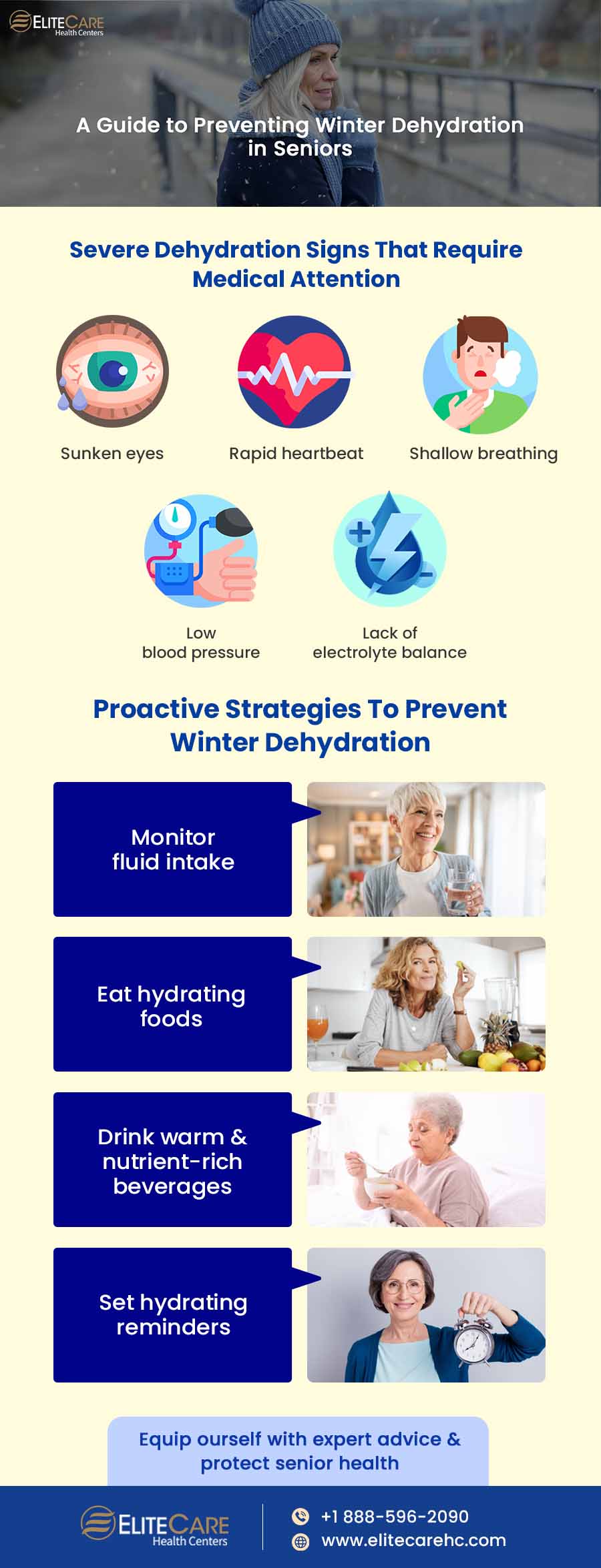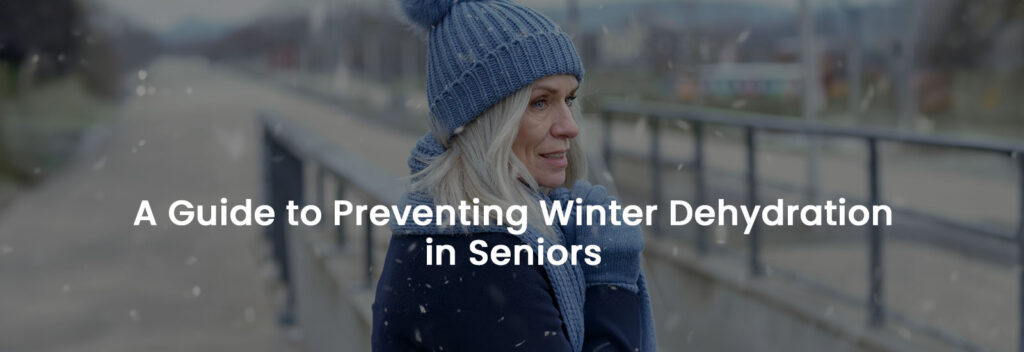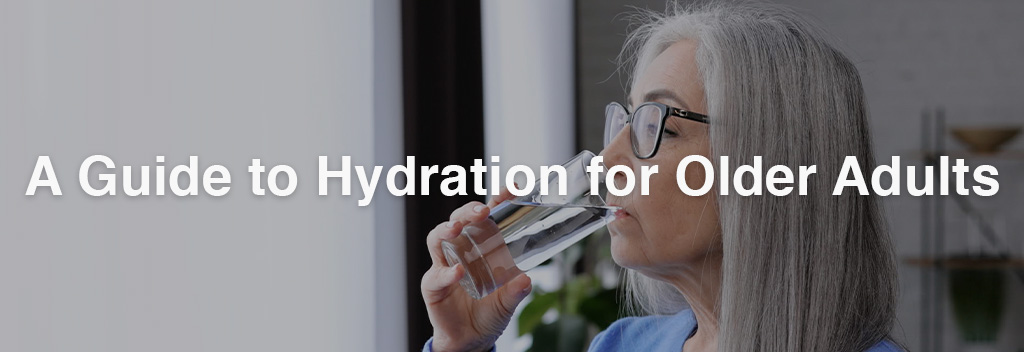
Staying hydrated is a fundamental pillar of good health. From supporting digestion to regulating body temperature, adequate hydration plays a pivotal role in our well-being. However, with age, maintaining proper hydration becomes even more critical. In winter, dehydration is a hidden challenge that requires special attention, particularly for seniors.
In a world where senior care services play an essential role in ensuring the well-being of the elderly population, it’s crucial to arm seniors and caregivers alike with the knowledge needed to combat dehydration effectively. By exploring the reasons behind senior vulnerability, addressing misconceptions about winter dehydration, and offering practical prevention ways, we aim to empower seniors and their caregivers to stay optimally hydrated in winter.
Understanding Winter Dehydration
As we age, the body undergoes various changes that make seniors vulnerable to dehydration. Two key factors that contribute to this sensitivity are as follows:
1. Altered Thirst Perception
Seniors often experience a reduced ability to sense thirst accurately. This diminished thirst perception can lead them to underestimate their fluid needs, resulting in inadequate hydration. Consequently, they may not feel the urge to drink even when their bodies require fluids.
2. Changes in Kidney Function
The efficiency of the kidneys’ ability to conserve water and concentrate urine decreases with age. Even small fluid losses can quickly disrupt the body’s fluid balance. As a result, seniors are more prone to experiencing dehydration from relatively minor fluid deficits.
Effects of Dehydration on Seniors
Dehydration in seniors can have far-reaching consequences that go beyond simple discomfort. The effects can be particularly pronounced during winter when dehydration might not be as easily recognized. Some of the potential health consequences include:
- Cognitive Decline: Dehydration can impair cognitive function, leading to difficulties in memory, attention, and overall cognitive performance.
- Increased Fall Risk: Dehydration can lead to dizziness, lightheadedness, and low blood pressure, all contributing to an increased risk of falls.
- Urinary Tract Infections (UTIs): Insufficient hydration can lead to concentrated urine, possibly contributing to developing urinary tract infections.
- Constipation: Dehydration can lead to harder stools and decreased bowel mobility.
- Skin and Mobility Issues: Dehydrated skin is more prone to dryness, itching, and pressure sores. Also, dehydration can worsen joint pain and mobility issues in seniors with arthritis.
According to a study published, the elderly population is 20% to 30% more prone to developing dehydration due to immobility, impaired thirst mechanism, diabetes, renal disease, and falls. With this knowledge, healthcare clinics are better equipped to address the issue urgently, especially in winter. Healthcare centers and primary care physicians can adopt proactive approaches to educate, prevent, and intervene.
Causes of Dehydration in Winter
Cold air tends to be drier, and when one breathes in this dry air, the respiratory system moistens it to warm it up. This process results in increased water loss from the respiratory tract. Even though we may not be sweating visibly like in the summer, our bodies still lose moisture through the breath in winter. During colder months, seniors might not experience the same level of thirst as during summer heat.
Due to the decreased thirst sensation during colder months, seniors (and people of all ages) must look beyond thirst as the sole indicator of hydration status. Relying on other indicators can help seniors maintain proper fluid balance. Online doctor consultations or routine physical exams can help seniors grasp the complexity of their physiological responses to cold weather. Medical clinics can also educate seniors about these factors by providing practical strategies for assessing hydration.
Signs of Dehydration to Watch For
Some typical symptoms of dehydration include:
- Dry mouth and thirst
- Dark urine
- Dizziness and lightheadedness
- Confusion
- Cognitive impairment
- Dry, flaky skin
When to Seek Medical Attention
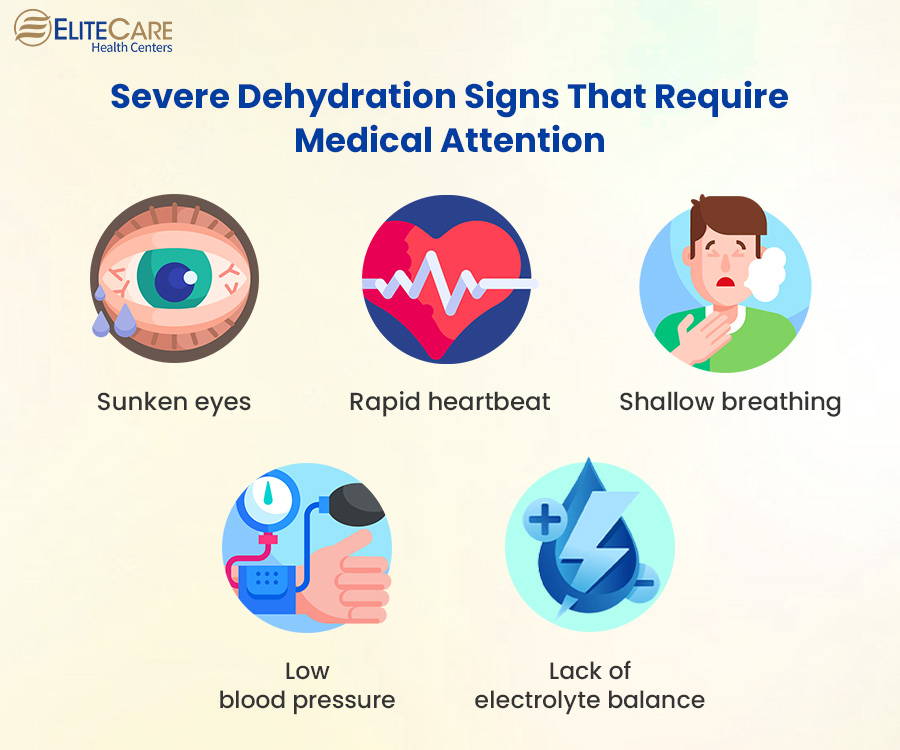
While seniors can manage mild dehydration by increasing fluid intake, promptly recognizing and addressing severe dehydration symptoms is crucial to prevent complications. Severe dehydration signs include:
- Sunken eyes
- Rapid heartbeat
- Shallow breathing
- Low blood pressure
- Lack of proper electrolyte balance
Whether near a primary care center or within reach of an elite medical center, recognizing dehydration symptoms and seeking timely medical assistance can’t be overstated. Educating seniors and their caregivers about these signs and the importance of seeking medical help can significantly prevent dehydration-related health issues.
Preventing Winter Dehydration
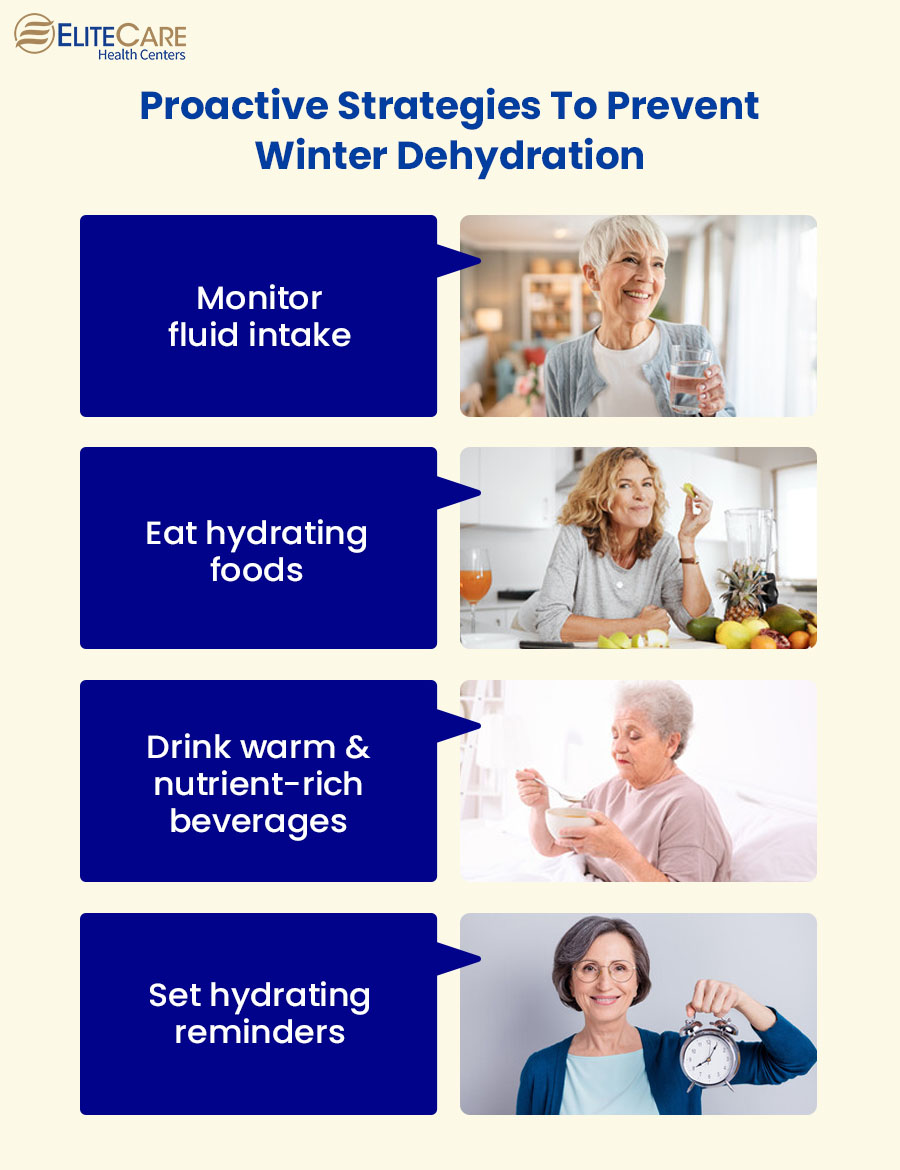
1. Monitoring Fluid Intake
Seniors should consume around 8 cups (64 ounces) of fluids daily. Still, individual needs may vary based on activity level and health status. To ensure adequate hydration, seniors can follow these tips to track their fluid intake:
- Keep a Hydration Journal: Maintain a journal to log the types and amounts of fluids consumed throughout the day.
- Use a Reusable Water Bottle: Carry a reusable water bottle and set goals for how many times it should be refilled at specific times.
- Set Timed Goals: Divide the day into segments and set fluid intake goals for each part.
2. Choosing Hydrating Foods
Primary care centers and elite health and wellness providers agree that a balanced diet plays a role in hydration. Seniors should incorporate water-rich foods, such as:
- Watermelon: Composed of over 90% water, watermelon is an excellent hydrating fruit.
- Cucumber: Cucumbers are almost 95% water and can be enjoyed in salads or as a crunchy snack.
- Oranges: Citrus fruits like oranges provide hydration through both their water content and natural juices.
- Celery: With its high-water content, celery can be a refreshing and hydrating addition to snacks.
- Lettuce: Leafy greens like lettuce are hydrating and versatile, making them perfect for salads.
3. Warm Beverage Options
In winter, warm beverages can provide comfort while contributing to hydration. Some hydrating choices are as follows:
- Herbal Teas: Herbal teas like chamomile, peppermint, and ginger can be soothing and hydrating without the diuretic effects of caffeine.
- Broths and Soups: Warm broths and clear soups not only provide hydration but also supply essential nutrients.
Limiting Caffeine and Alcohol: Both caffeine and alcohol can contribute to dehydration due to their diuretic effects. Encourage moderation and balance by drinking water alongside these beverages.
4. Setting Hydration Reminders
Seniors might need a little help remembering to stay hydrated. Consider these strategies to ensure regular fluid intake:
- Timers and Alarms: Set alarms or timers on their watches or phones to remind them to drink fluids at specific intervals.
- Hydration Apps: Numerous smartphone apps are designed to track and remind users to drink water regularly.
- Caregiver Assistance: Family members or caregivers can assist by offering fluids and reminding seniors to drink throughout the day.
Creating a Hydration-Friendly Environment
1. Humidification
During the colder months, indoor air tends to become dry due to the use of heating systems. This dry air can lead to increased respiratory water loss and moisture evaporation from the skin. Using a humidifier to add moisture to the air helps moisturize the respiratory tract, preventing excessive moisture evaporation from the skin.
2. Dressing Appropriately
While dressing warmly in winter is essential, seniors should also be mindful of overheating, which can lead to excessive sweating and fluid loss. Layering clothing allows seniors to adjust to changing temperatures and activities, preventing overheating. Layering can also help avoid rapid cooling from outdoor cold to indoor warmth. When selecting clothing layers, opt for breathable fabrics that allow moisture to escape. It prevents sweat from becoming trapped against the skin, reducing the risk of dehydration.
The Bottom Line
As we’ve explored the intricacies of winter dehydration and its impact on seniors, it’s evident that staying adequately hydrated is essential for overall well-being. EliteCare Health Centers offer specialized expertise to address and prevent dehydration issues. From personalized hydration plans to expert guidance on choosing hydrating foods and beverages, we are equipped to ensure seniors receive the care they need to stay healthy and hydrated throughout the year.
